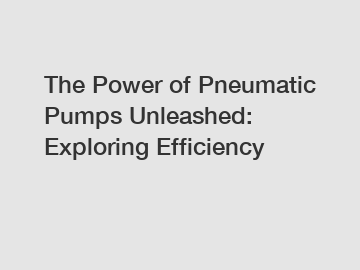Jan. 07, 2024
Energy
The Power of Pneumatic Pumps Unleashed: Exploring Efficiency?
Pneumatic pumps, also known as air-operated pumps, have become a crucial component in various industries. With their ability to efficiently transfer and move fluids, they have revolutionized many processes. But just how powerful are these pneumatic pumps, and how can they enhance overall efficiency? Let's delve into these questions and explore the incredible capabilities of pneumatic pumps.
1. Operating Principles:

Pneumatic pumps work on the principle of air compression. Compressed air is used to generate pressure, which in turn creates a vacuum effect, causing fluids to be drawn into the pump. As the air is released, the fluid is then forced out, enabling effective transfer. This mechanism allows pneumatic pumps to handle a wide range of viscosity levels, from light liquids to highly viscous substances.
2. Versatile Applications:
The power of pneumatic pumps lies in their versatility. They are employed across numerous sectors, including automotive, manufacturing, food and beverage, oil and gas, and wastewater treatment, among others. These pumps are used for tasks such as fluid transfer, spraying, mixing, and draining. Their ability to handle different types of fluids, including corrosive and abrasive substances, further enhances their suitability for diverse applications.
3. Enhanced Efficiency:
Pneumatic pumps offer several advantages that contribute to enhanced efficiency:
- High Flow Rates: Pneumatic pumps can deliver high flow rates, allowing for quick and effective fluid transfer. This translates to increased productivity and reduced downtime, especially in time-sensitive operations.
- Self-Priming: Many pneumatic pumps are capable of self-priming, which means they can draw fluid into the pump without the need for manual priming. This feature eliminates the time-consuming task of manually filling the pump before operation, saving valuable time and effort.
- Low Maintenance: Pneumatic pumps are renowned for their durability and low maintenance requirements. They have fewer components compared to traditional pumps, reducing the chances of breakdowns and minimizing the need for costly repairs. This advantage maximizes uptime and reduces overall maintenance costs.
- Explosion-Proof: In industries where flammable or explosive fluids are handled, pneumatic pumps provide a safe solution. Since they operate on compressed air rather than electricity, the risk of ignition or sparking is greatly diminished. This makes pneumatic pumps an ideal choice for hazardous environments.
4. Environmental Considerations:
Another benefit of using pneumatic pumps is their environmental friendliness. Unlike electric pumps, they do not consume electricity or produce heat during operation, resulting in lower energy consumption and reduced greenhouse gas emissions. This makes pneumatic pumps an eco-friendly choice, aligning with the global push toward sustainability.
In conclusion, the power of pneumatic pumps is truly unleashed in their ability to enhance efficiency across various industries. Their versatile applications, high flow rates, self-priming capabilities, low maintenance requirements, and suitability for hazardous environments make them a preferred choice for fluid transfer and handling. Additionally, their eco-friendly nature further solidifies their importance in a world striving for sustainable solutions.
Whether it's improving productivity, reducing downtime, or ensuring safety, pneumatic pumps offer a reliable and efficient solution. As technology continues to advance, we can expect further enhancements in pneumatic pump design and capabilities, leading to even greater efficiency and effectiveness in the years to come. So, if you're looking to optimize your fluid handling processes, consider embracing the power of pneumatic pumps and experience the benefits firsthand.
If you are looking for more details, kindly visit working principle of piston pump, full polypropylene diaphragm pump, diaphragm pump sizes.
Previous: Which Innovative Features Make the 5kW Grid Inverter Stand Out?
Next: Revolutionize Parking Spaces with Solar-Powered Lots: Maximize Energy, Minimize Costs
If you are interested in sending in a Guest Blogger Submission,welcome to write for us!
All Comments ( 0 )